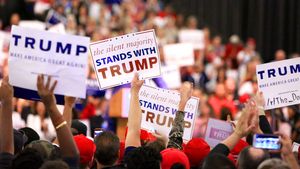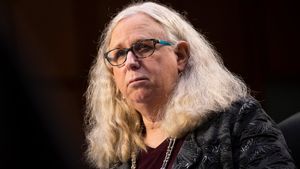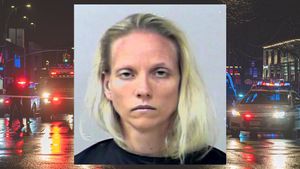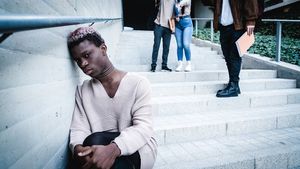Over the past month, an image and a subsequent email exchange has caused quite the controversy for Washington, D.C.-based and gay-owned bar, JR's.
In 2012, the manager of the popular bar requested their then graphic designer from the LGBTQ publication Metro Weekly to produce a flyer for an Olympic-themed happy hour. When the proof was forwarded to the manager, David Perruzza, he requested that the image be changed to a "hot white guy" instead of a black man because "[t]hat's more of our clientele."
The image never came out and the bar ultimately decided to remove the black model from the image and use no one. But this past week this exchange has quickly become just another piece of evidence to queer people of color in Washington, D.C, and even across the US, that LGBTQ bars continue to be a place where people of color are not welcome.
But what would it take to change this? And should bars be held more accountable for any racism experienced in their establishments? Well, the answers may be found in the city of brotherly love, Philadelphia, where the relationship between black residents and white bar management is increasingly tense.
In September 2016, Darryl DePiano, owner of Philadelphia gay bar ICandy, was caught on camera referring to a number of black patrons as "n****rs." In the 22-second video, allegedly recorded in 2013, DePiano can be overheard complaining about black customers asking for passes that would get them access to free drinks.
"And Ricky Peterson, nig, nig, nig, nig, n****rs-everyone of them," DePiano said. "All three of them that ask you for drink passes are n****rs."
Related | Kenzo Pays Homage to Queer Safe Spaces in Powerful New Mini-Film
This incident was a tipping point for building reports of discrimination in the city's downtown Gayborhood and substantiated many past accusations of racism throughout the city, notes D'Ontace Keyes, the commissioner of the Philadelphia Commission on Human Relations (PCHR). PCHR received several complaints--both formal and informal--from city residents, which forced a larger response.
"From that, LGBTQ people of color boycotted ICandy and other Gayborhood bars, and demanded answers from the city regarding its policies," Keyes says. "This and other incidences outraged Philly residents and many took their concerns to the streets and to PCHR."
Despite DePiano's apology--given only after the video resurfaced--it was abundantly clear that white gay bar owners (and patrons) rarely respect black customers despite also being LGBTQ--and it's because for many white LGBTQ people, queerness is irrelevant when blackness is intersecting with it. Black LGBTQ people in many parts of the US, for example, realized just how racist the white LGBTQ community can be when we demanded mainstream LGBTQ organizations to speak out against state/police violence or, in 2013, when we merely asked to speak up for voting rights' protections. It can sometimes appear that white LGBTQ people don't think about what's also good for black LGBTQ people because it's assumed that queerness is the critical lens. But, black LGBTQ dont have the privilege of separating racial identity and sexual/gender identity, so we're left with the occasionally unenviable task of uplifting both.
Related | The New Black Vanguard: Queer People of Color Leading the Revolution
As a commissioner, Keyes and others then worked with the PCHR to produce a comprehensive report, Inform Monitor Enforce: Addressing Racism and Discrimination in Philadelphia's LGBTQ Community, to inform the community on incidents and enforcement of the fair practice ordinance, including a series of trainings to reduce discrimination in identified spaces. As a result of PCHR's investigation, gay bars owned by cis-white men must now undergo racial sensitivity training or face fines.
Gayborhood bars will now be responsible for updating any dress code policies that have caused prior discrimination. PCHR also recommends that the staff of Gayborhood bars should reflect the nuances and diversity of the LGBTQ community and management must create paths for advancement in employment to ensure this happens. Failure to comply with PCHR's recommendations may result in compensatory and punitive damages, injunctive relief, and attorney's fees.
And in the wake of such explicit on-going conversations about accountability within the Philadelphia scene, bar owners have begun to make changes before the city intervenes. One such example is Tabu Lounge & Sports Bar.
Jeffrey Sotland realized he needed to change Tabu's atmosphere after speaking to a black lesbian woman who challenged his idea that LGBTQ bars and clubs were always safe spaces for all queer and trans people.
Related | Must-Know: This Chicago Party is Changing the Social Landscape for Queer Women
"You may think you have a safe space but it is mainly one for you, not for people who don't feel comfortable in your space," Sotland told Out. "So, the first thing we stopped doing at Tabu is claiming that we offered a safe space for all LGBTQ people."
It was then that Sotland began critiquing the role of security guards policing people in gay bars and clubs--later recognizing that not all security are providing a safe space for patrons, especially for LGBTQ people of color. "If your front door people are a problem, then so is your bar," he noted. "Unlike others, we tend to hire security that is respectful of patrons, who are easy to work with, and who understand the community on a larger scale."
Black and brown LGBTQ people, in particular, understand the importance of security that is conscious of their experiences.
Like the paid staff of the 11 bars and clubs required to enroll in sensitivity trainings in the Gayborhood, it's also critical that security--even independent contractors--are trained in accordance with PCHR's groundbreaking guidance. But because much of the security is contracted, and not paid staff, they may miss important trainings. Sotland, however, is pushing to ensure that any worker who touches his facilities will be trained.
"As bar owners, we are now going through mandated implicit bias trainings, but we are also encouraging our security to undergo this training--a training they aren't technically mandated to attend," Sotland notes.
This is a start but gay bars have room to grow to provide actual safe spaces for LGBTQ patrons of color.

What's next for white gay bar owners?
There isn't necessarily an easy answer.
Amid marginalized communities finding ways to survive a President Trump administration, it's clear that we will see minimal progress without having honest conversations around racism in the queer and trans communities. Racism, sexism, and transphobia are foundational to this country. Queer people didn't invent them, but we can't separate them from the LGBTQ community. White gay bar owners must especially hold themselves accountable to providing safe spaces for anyone entering its establishment.
There are ultimately two options: work with queer establishments that serve mostly white patrons to demand safe spaces for all and/or center efforts on celebrating venues that already cater to namely black queer people. Audre Lorde's "the master's tools will never dismantle the master's house" compels me to side with the latter.
Related | Weapons as Art: Queer Hate Crimes Seen Up Close
In D.C. specifically, although very few, there are establishments that cater to black queer people--including The Fireplace and The Bachelors Mill. If these also obviously imperfect places are not celebrated, we'll fall victim for being in an unwelcoming, and sometimes, hostile, environment for people who don't have our best interests at heart. Besides, those places pour stronger cocktails and at a much more reasonable price anyhow.
In the meantime, we can learn something from Philadelphia's black LGBTQ residents, who demanded equitable treatment directly from the people that have rendered safe spaces no longer safe. People taking power, especially money, out of the hands of owners have usually been an effective solution for change.
Bar owners like Ed Bailey--who have openly admitted to and apologized for past mistakes and arguably racist history of Number Nine DC--has committed himself to being more open about his white privilege and taking that into account when hiring bartenders. Recently, Bailey has started discussions with Jessica Raven, Executive Director of Collective Action for Safe Spaces (CASS), on training staff in responding to aggression--from anti-black and anti-Muslim racism to sexual and gender-based harassment.
But, more is needed and bar owners can start within their own staff.
"When you are a bartender, you are the face of the establishment. As an owner, you certainly hope your staff is astute enough to handle intense situations with an appropriate amount of energy," Bailey told OUT. "I tend to hire friends and people I trust, but my fear is that we won't respond in a way that makes things better for people."
Bailey is right to have that fear. White bar owners must focus on intentionally hiring staff that are as diverse as the community they are serving. This is impossible if these bar owners are merely selecting staff based on friendship.
Of course, all of this means nothing if the larger LGBTQ community doesn't even recognize that racism is a problem to fix in the first place.
Preston Mitchum is a Washington, DC-based writer, activist, and policy nerd. He is a regular contributor to The Root and theGrio and has previously written for the Atlantic, The Daily Dot, Ebony.com, Huffington Post, Hello Beautiful, and Think Progress. Follow him on Twitter here to see just how much he appreciates intersectionality.








































































